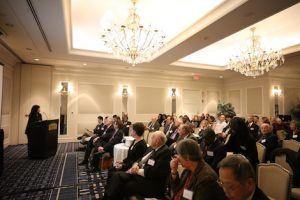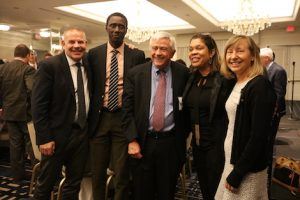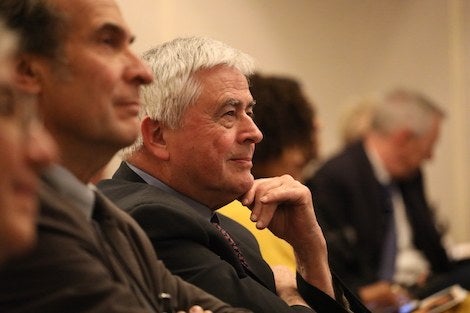November 27, 2018 – They arrived at Boston’s Colonnade Hotel from as nearby as Cambridge and as far away as Botswana. There were doctors and veterinarians, scientists and a head of state. And they were all there to celebrate trailblazing AIDS researcher Max Essex.
On November 9, 2018, Harvard. T.H. Chan School of Public Health along with the Harvard T.H. Chan School of Public Health AIDS Initiative, hosted a scientific symposium to honor Essex, the Mary Woodard Lasker Professor of Health Sciences, as he prepares for retirement.
Essex’s career spans more than four decades and is punctuated by impressive achievements at every point along the way. In the early 1980s, he was among the first scientists to hypothesize that a retrovirus was the cause of AIDS. His research was instrumental in creating the first widely used HIV-blood screening test, and he helped establish both the Harvard T.H. Chan School of Public Health AIDS Initiative (HAI) and the Botswana–Harvard AIDS Institute Partnership.
During welcoming remarks, Phyllis Kanki, professor of immunology and infectious diseases at Harvard Chan School, noted that Essex has been an influential educator and mentor who’s trained dozens of doctoral research students and many more postdoctoral fellows. In addition, he has authored or co-authored more than 600 peer-reviewed papers. “Don’t worry, we’re not going to go through each of them,” Kanki joked.
Cutting-edge work
The symposium did, however, trace the evolution of Essex’s scientific endeavors and show how far his influence continues to reach. It featured sessions and presentations from Essex’s colleagues, mentees, and collaborators. Sue Cotter, distinguished professor emeritus at Cummings School of Veterinary Medicine at Tufts University, recalled Essex’s formative years, when they were working together on feline leukemia. Their work took them into homes with dozens of cats and revealed that feline leukemia was in fact contagious and associated with immunodeficiency—findings that would inform Essex’s early work on AIDS.
Among the highlights of the symposium was discussion of the high-impact work of the Botswana–Harvard AIDS Institute Partnership, a collaboration between the Ministry of Health in Botswana and HAI that began in 1996. The program, which established a state-of-the-art laboratory in Botswana, has helped carry out critical epidemiologic work in the country and launched ongoing projects aimed at curbing mother-to-child transmission of HIV, understanding resistance and adherence to antiretroviral drugs, and conducting genomic analysis of HIV-1C, the viral subtype predominant in southern Africa.
Festus Mogae, who was president of Botswana from 1998 to 2008, recalled the severity of the AIDS crisis in his country when he took office. “In the absence of assistance, we faced extinction,” he said. He commended Essex not only for his scientific accomplishments but also for his commitment to building local capacity by training health care workers and scientists from Botswana and surrounding countries. “I’m proud that there are so many Africans that now know as much about the science of HIV and AIDS as you do,” he said.
Generous collaborator
Many of the presenters showcased their current research efforts and discussed how it built upon the work of Essex. For instance, Roger Shapiro, associate professor of immunology and infectious diseases at Harvard Chan School, presented data on birth outcomes among HIV-infected and HIV-uninfected women in Botswana with an eye toward understanding the impact different drug regimens have on the health of mother and child. Kanki mentioned how samples and data collected from a 20-year-long study of commercial sex workers in Senegal that Essex helped launch is leading to new insights on the Zika virus.
In between data-rich slides, presenters slipped in candid photos of Essex and shared humorous anecdotes about unexpected trips to Logan Airport to pick up giant giraffe sculptures and impromptu late-night meetings. “I first met Max when I was in my pajamas in a hotel in Washington, D.C.,” Joseph Makhema, chief executive officer of the Botswana-Harvard AIDS Institute Partnership, said with a chuckle. He recalled Essex sitting on the corner of his bed and talking late into the night about what could be done to stem the tide of AIDS in Botswana. “Low and behold, we were soon back in Botswana drawing blood samples,” he said.
Among the laughs and reminiscences, the attendees were keenly aware of the suffering and loss of life inflicted by the AIDS epidemic. While each person who spoke at the symposium had been influenced by Essex differently, they all agreed on one thing: They couldn’t have asked for a better mentor or friend.
As Maurice Tempelsman, co-chair of HAI’s International Advisory Council, put it, Essex has embarked on “remarkable quest that has led to remarkable scientific and medical breakthroughs—breakthroughs that continue to affect the health and well-being of millions of people today.”


View photos from the symposium honoring Max Essex.
View photos from the dinner in honor of Max Essex.
Photos: Dominic Chavez
